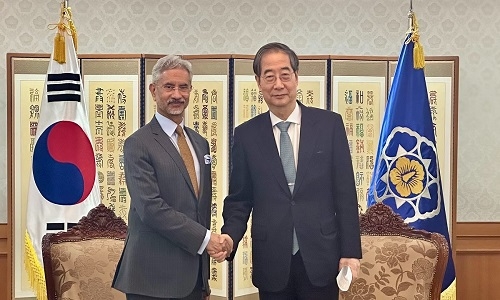EAM Jaishankar appreciates South Korean PM’s positive sentiments for bilateral ties
| Date :06-Mar-2024 |

SEOUL,
EXTERNAL Affairs Minister S Jaishankar on Tuesday called on South Korean Prime Minister Han Duck-soo and discussed with him ways to further enhance bilateral ties.
Jaishankar is here on the first leg of his four-day visit to South Korea and Japan. He will co-chair the 10th India-South Korea Joint Commission Meeting (JCM) with his counterpart Cho Tae-yul during the visit.
“Honored to call on @PrimeMinisterKR Han Duck-soo today in Seoul. Appreciated his positive sentiments for India-South Korea ties and value his guidance ahead of the 10th Joint Commission Meeting tomorrow,” Jaishankar posted on X.
The JCM is expected to comprehensively review the entire gamut of bilateral cooperation and explore avenues for further strengthening it. It will also provide an opportunity for the two sides to exchange views on regional and global issues of mutual interest, the Minister said in New Delhi ahead of Jaishankar’s visit.
Earlier, Jaishankar met South Korea’s national security advisor Chang Ho-jin and held useful discussions with him on the shared convergences in the Indo-Pacific region and contemporary regional and global issues.
“Good start to my South Korea visit. Meeting with the Director of National Security Chang Ho-jin in Seoul today. A useful discussion on our shared convergences in the Indo-Pacific and contemporary regional & global issues,” Jaishankar posted on X.
He also met Trade, Industry and Energy Minister Ahn Dukgeun.
“Wide-ranging conversation on our trade and economic cooperation, both current and future, which is at the heart of India-South Korea relationship,” Jaishankar said.
He also held an interesting conversation with think tank representatives of South Korea.
“Our exchanges and interaction would only increase as the convergences between our two countries grow,” Jaishankar said. The Special Strategic Partnership between India and South Korea has expanded to diverse areas of cooperation, which include trade, investments, defence, education, science and technology and culture. The era when a few powers exercised “disproportionate influence” over the reshaping of the global order is a thing of the past so India and South Korea have a growing responsibility to actively contribute to the process, External Affairs Minister S Jaishankar said.
Speaking at the Korea National Diplomatic Academy, Jaishankar who is here on a two-day visit, said India’s partnership with the Republic of Korea is acquiring a greater salience in a more uncertain and volatile world.
“India and South Korea have a growing responsibility to actively contribute to the reshaping of the global order.
The era when a few powers exercised disproportionate influence over that process is now behind us,” he said.
“Willy-nilly, it has become a more collaborative and broad-based endeavour. That multilateralism has also stalled and being replaced in good measure by plurilateralism is a factor as well,” he said.
Jaishankar said issues like countering terrorism or Weapons of mass Destruction proliferation or indeed ensuring maritime safety and security matter fundamentally to both nations.
“In recent years, challenges like terrorism and WMD proliferation have impacted our national security. We have learnt to be sensitive to changing currents of the global order. While our solutions may be suited to our particular national circumstances, working together has always been to our common advantage,” he said.
The concept of the Indo-Pacific emerged as a consequence of geo-political shifts in the last few decades, he said.
“India’s stakes in terms of trade, investment, services, resources, logistics and technology in the Indo-Pacific are growing by the day. Ensuring the stability, safety and security of this region is therefore vital for us. We have an obligation to the global commons, just as we have a duty to do global good,” he said.